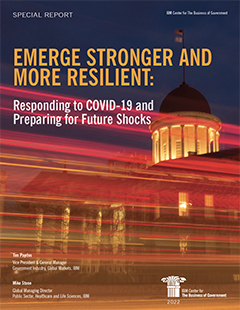
Emerge Stronger and More Resilient: Responding to COVID-19 and Preparing for Future Shocks

Moreover, collective strategies have led to identification and resolution of challenges in way that brings together government leaders, scientists, data analysts, health care organizations, academic institutions, and industry.
This new report, Emerge Stronger and More Resilient: Responding to COVID-19 and Preparing for Future Shocks, is by IBM Global Government leaders Tim Paydos and Mike Stone, as well as a set of contributing authors and IBM experts in a broad range of public sector issues. It builds off a series of blog posts to frame a roadmap for the public sector on strategies and actions to move forward.
The report emerges from the context of this unanticipated, often wrenching historical moment. As governments have led response activity through a global emergency, they have sought to manage impacts to their agency missions and citizenry. At the same time, the advent of emerging technologies has catalyzed action, both to respond to current conditions and to build capacity for the aftermath of COVID-19, as well as for preparation of future crises. Some of these technologies include:
- Artificial intelligence and cognitive analytics to help focus testing and vaccine distribution, predict where the virus will spread, and match resources to demand
- Hybrid cloud computing models that allow new systems to link with existing infrastructure seamlessly
- Mobility tools and infrastructure to ease the intensifying strain on citizen services and to enable distance work
- Self-service tools for the public to access and receive services to help maintain physical and mental health, income, and public safety
This technical infrastructure of the twenty-first century provides a strong foundation for advancing government actions to move forward from COVID-19 in a way that advances the health of nations. In the longer term, such movement can enable the public, private, and nonprofit sectors to work together in addressing important challenges for society, including:
- The changing nature of remote and hybrid workplaces that provide opportunities for reskilling and addressing worker health and safety
- The transformation of government organizations and operations to focus on crossboundary collaboration and shared analytics to develop policies and programs around public needs
- The building of trust among government and the public interests, based on well-delivered services that are effectively communicated from agencies to the citizenry
The report provides insights and highlights opportunities for government to address these challenges. It includes essays that focus on promoting digital enablement of citizens, modernized supply chains, strong cybersecurity, and emerging analytics frameworks. The report concludes with a call to action for governments and their partners to work together—in an effort to emerge stronger and more resilient from our collective experience— and build a better society.



